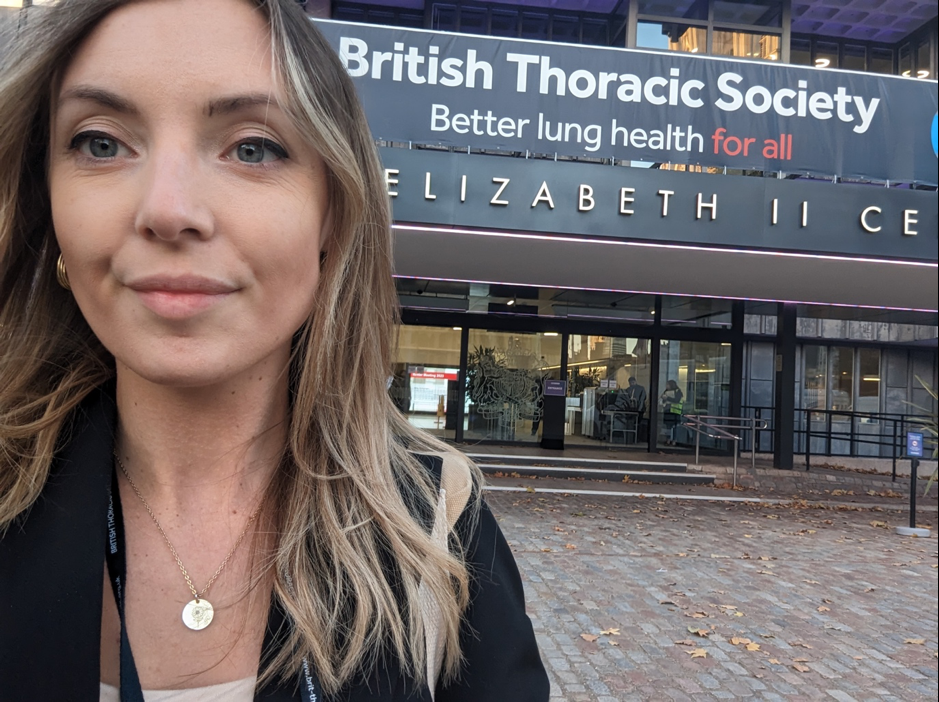Enya Daynes found many examples of physios leading research and influencing care at BTS meeting
In an exclusive article for PhysioUpdate, clinical academic physiotherapist Dr Enya Daynes reports from the British Thoracic Society’s (BTS) winter meeting, which took place at the QEII Centre in London from 22-24 November. Her report follows:
More than 2,000 delegates came together earlier this month to highlight examples of leading research in the field of respiratory care. As usual, physiotherapists had a strong presence at the event and shared high-quality research and built important networks.
This year we hosted a pulmonary rehabilitation (PR) symposium on extending the scope of PR, welcoming an all-physiotherapist line-up. I joined Professor Annemarie Lee from Monash University in Melbourne and Dr Sarah Buttery, from the Royal Brompton and Harefield hospitals on the platform.
We focused on a range of conditions that can benefit from PR interventions, including bronchiectasis, interstitial lung disease, asthma, post-Covid and in identifying/preparing patients for lung volume reduction interventions. This session showed the valuable role that physiotherapists play in transforming the lives of those living with respiratory disease and demonstrated how physiotherapists lead influential research studies.
Innovation and ideas
In addition to the symposium, there were many interesting poster and spoken sessions covering chronic obstructive pulmonary disease exacerbations, virtual wards/care, lessons from the physiology lab and advances in infectious diseases.
Many of these sessions were chaired by, and included presentations from, physiotherapists. Speakers and delegates demonstrated innovation in clinical services around the country and shared ideas for improvements.
The inaugural lecture on the opening day was an inspiring session from Professor Sir Martin Landray, who is based at the University of Oxford. He shared his wisdom on ‘smarter’ trials for better health. Following from the success of the RECOVERY Trial, which saved millions of lives, Professor Landray shared his experience on simple and implementable trial designs.
He also highlighted how everyone can play a role in research and in moving respiratory care forwards, regardless of experience.
A chance to 'share and learn'
Delegates heard many example of how physiotherapists influence respiratory care and display innovation in service delivery. One of the most valuable parts of the conference is sharing these experiences and learning from one another. As a result, there are many opportunities for networking within the profession and with those from different professions.
This is best opportunity to network came at the President’s reception on Thursday evening: with drinks and nibbles available it was a great opportunity for me to catch up with colleagues I have long admired but see much less frequently than I would like! You can always find a group of physiotherapists around the Association of Chartered Physiotherapists in Respiratory Care stand, where the team does an excellent job of promoting the profession and supporting colleagues.
How can you get involved in BTS activities?
- The BTS hosts a number of specialist advisory groups (SAGs) for clinicians to make an important contribution to the national direction of respiratory care. This is a supportive environment where physiotherapists can provide valuable input. Additionally, you can get involved with other activities such as the education committee, BTS council, quality improvement committee and presidential positions.
- The BTS also hosts numerous short courses, many of which include physiotherapists as speakers, and are open to volunteers to facilitate. Notably, there was an additional course on chronic breathlessness earlier this year, which successfully highlighted the importance of non-medical management, where physiotherapists are leading the way.
- The best way to get involved in BTS activities is to contact the SAG chairs or look out for activities highlighted in the BTS newsletter. This also includes the generation of guidelines, clinical statements and quality standards. The BTS is very supportive and encourages applications from people with varying levels of experience. The benefits of engaging with these activities are immeasurable and allows for improvement in clinical, evidence-based care, and having knowledge of the wider picture in respiratory disease, and how we can be influential in steering that.
- Lastly, one of the best ways to get involved is to attend the BTS’s winter and summer meetings, where you can meet other respiratory physiotherapists from across the UK and be inspired by their brilliant work.
Dr Enya Daynes is clinical academic physiotherapist who is based at University Hospitals of Leicester NHS Trust. She is a member of the BTS Pulmonary Rehabilitation Specialist Advisory Group. In the latter role, she helped to draw up a Clinical Statement on Pulmonary Rehabilitation, which was covered in a PhysioUpdate article earlier this year.
To find out more about the BTS, click
Author: Enya DaynesShare it with















